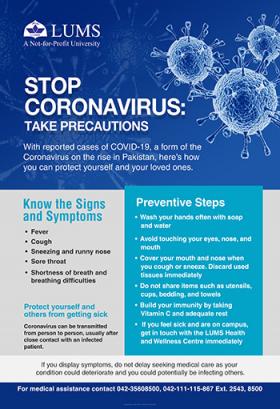Coronavirus Advisory
If you have any flu-like symptoms, you are advised to stay home, self-isolate and notify the University immediately. If you require medical assistance on campus, please call 042-3560 8500 or direct dial extension at 2543/8500.
Be sure to check this page regularly for latest updates and guidelines.
What is a coronavirus?
Coronaviruses (CoV) are a large family of viruses responsible for causing illness ranging from common cold to more severe diseases like MERS-CoV and SARS-CoV.
The most recently discovered coronavirus causes coronavirus disease COVID-19. This is a new strain that has not been previously identified in humans and does not currently have vaccine or known treatment.
Symptoms
Common symptoms of COVID–19 include:
- Fever
- Cough
- Shortness of breath
- Breathing difficulties
In more severe cases, infection can cause pneumonia and severe acute respiratory syndrome.
INFORMATIVE VIDEOS ON COVID-19 BY OUR STUDENTS
The Coronavirus or COVID-19 is one of the fastest spreading pandemics our world has faced to date. Be one step ahead by getting accurate facts and taking the right precautions. Watch this video made by our students to create awareness about the virus.
The Coronavirus may be a pandemic but we can all take the right precautions to deal with it. Listen to our students talk about preventive measures and steps you can take to avoid the spread of the virus.
Precautions
Watch this video for basic hygiene measures to protect yourself:
https://openwho.org/courses/eprotect-acute-respiratory-infections
To prevent infection, it is recommended to take following precautions:
- Regularly and thoroughly clean your hands with an alcohol-based hand rub or wash them with soap and water. This kills viruses that may be on your hands.
- Cover your mouth and nose when coughing and sneezing, and encourage others to do the same.
- Thoroughly cook meat and eggs
- Avoid close contact with anyone showing symptoms of respiratory illness, such as coughing and sneezing.
- Avoid touching eyes, nose and mouth. Hands touch many surfaces and can pick up viruses. Once contaminated, hands can transfer the virus to your eyes, nose or mouth. From there, the virus can enter your body and can make you sick.
- Stay home if you feel unwell. If you have a fever, cough and difficulty breathing, seek medical attention.
- Avoid unnecessary travel
- Avoid congregating in large groups
HEC GUIDELINES FOR UNIVERSITIES ON COVID-19
For detailed guidelines read the Comprehensive HEC Policy/Guidelines for Universities and DAIs on COVID-19.
EXTERNAL RESOURCES
Some key reference links for more information and awareness are given below:
- Courtesy London Business School: The economics of a Pandemic: the case of Covid 19.
Read about how Covid 19 is the worst health crisis of our times, know the health policies related to it, that global recession seems inevitable and the macroeconomics related to the pandemic. - Courtesy Stanford Care: Managing Covid at Home
- https://www.hec.gov.pk/english/HECAnnouncements/Pages/Awareness-Corona-Virus.aspx
- https://www.who.int/health-topics/coronavirus
FAQs
Browse through the Frequently Asked Questions (FAQs) to find the answers to common queries.
 Download USAID Report
Download USAID Report

